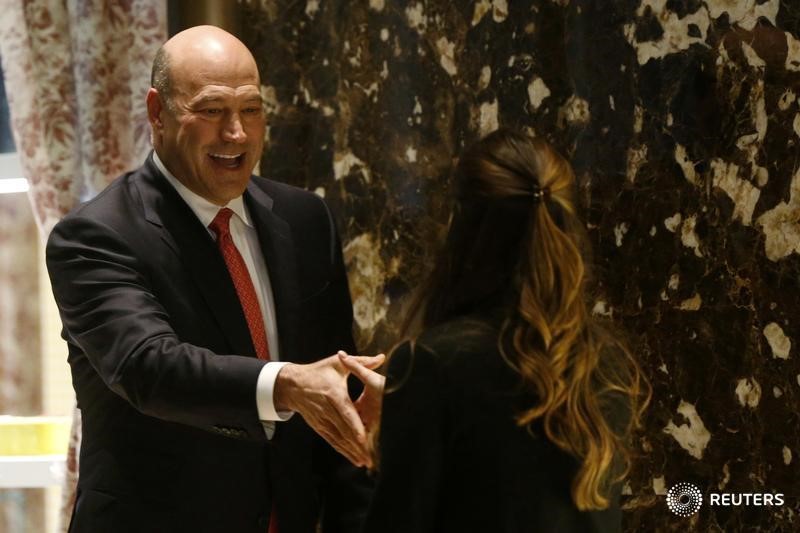By Steve Holland and Olivia Oran
NEW YORK (Reuters) - President-elect Donald Trump is considering Goldman Sachs (NYSE:GS) President and Chief Operating Officer Gary Cohn to head the White House budget office or to fill other positions, a Trump transition official said on Wednesday.
Cohn, 56, a former Goldman commodities trader who joined the firm in 1990, has been widely considered to be the heir apparent to Chief Executive Officer Lloyd Blankfein.
Dow Jones reported earlier on Wednesday that Cohn, who met with Trump on Tuesday, has had discussions about leaving the firm.
If Cohn is picked to become Trump's budget director and is subsequently confirmed by the U.S. Senate early next year, he would play a lead role in formulating spending priorities for domestic and international programs funded by Washington.
The budgets produced annually by the White House's Office of Management and Budget are a reflection of every administration's legislative priorities and a blueprint for detailed spending and tax bills the president wants Congress to consider.
Cohn has donated both to Democrats and Republicans over the years. He has given more recently to Republicans, including $33,400 to the National Republican Congressional Committee in 2015, according to campaign contribution records. They also showed that in 2007 and 2008, Cohn donated to Democrats Barack Obama and Hillary Clinton's presidential campaigns.
Cohn is a former Goldman commodities trader from Ohio who joined the firm in 1990. He served in a variety of leadership roles in bond trading, becoming co-head of Goldman's broader securities and eventually, co-president in 2006.
He makes frequent appearances at industry conferences and on television, where he speaks about the state of the financial markets.
Cohn struggled with dyslexia as a child and bounced from school to school, according to a Malcolm Gladwell profile from his book "David and Goliath."
Cohn is typically known throughout Goldman for his direct and abrasive manner in dealing with colleagues, although he has become more polished in recent years, current and former executives said.
Leaving Goldman to go to Washington would not be the first time that Cohn had taken a big risk.
He was given his first job on Wall Street after visiting the trading pit and sharing a cab with one of the traders to LaGuardia airport. Although Cohn knew nothing about trading options, he convinced the trader to give him an interview opportunity and he eventually landed a job on the floor of the commodities exchange.
"Everything I've done in my career ... is to take risks," Cohn said in a 2009 speech at American University's Kogod School of Business to new graduates.
Alongside Blankfein, Cohn is one of the few senior executives left on Wall Street who navigated through the financial crisis. Cohn's co-president, Jon Winkelried, left the firm in 2009.
But with Blankfein showing no sign that he will step down soon, some inside the firm have wondered if Cohn has other aspirations outside the Wall Street bank.
Pacific Investment Management Co in 2013 had considered Cohn to replace Mohamed El-Erian. But discussions never progressed beyond an initial stage, according to reports at the time.
Cohn is just one of a cadre of other former Goldman Sachs executives who are slated to join the Trump administration, including incoming Treasury Secretary Steven Mnuchin and White House adviser Steve Bannon.

With the U.S. Senate and House of Representatives both under Republican control, Trump's budget proposals are likely to get much more serious consideration than budgets submitted over the past few years by President Barack Obama, a Democrat who was regularly at odds with Republican lawmakers.